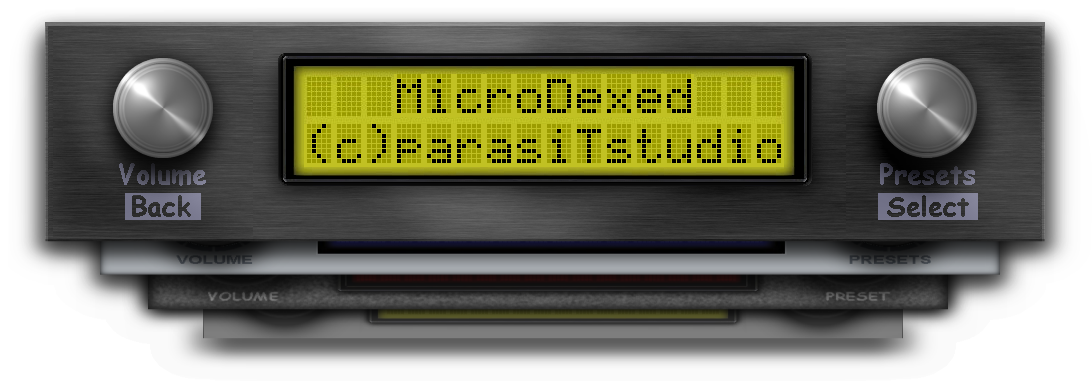4.0 KiB
| fontfamily | fontsize | geometry |
|---|---|---|
| dejavu | 16pt | a4paper,margin=2cm |
MicroDexed
Version 1.0 (June 2020)
What is MicroDexed?
MicroDexed is a FM-Software-Synthesizer with six operators and much additional features. It is written in C/C++ for the microcontroller Teensy-3.6/4.x. The sound generation (msfa) from the free VST-plugin Dexed was used and a user interface was created using two encoders and an LCD display.
For the original Dexed/msfa software take a look at Dexed on Github and Music Synthesizer for Android on Github.
Features
- Compatible to a legendary FM synth with six operators from a famous Japanese manufacturer
- MIDI interface:
- DIN IN/OUT with software THRU (can be disabled, optional hardware THRU possible)
- USB-Slave (for connecting to a PC)
- USB-Master (for connecting keyboards)
- Audio interface:
- RCA stereo IN/OUT with audio THRU (daisy-chain your sound generators)
- Onboard effects:
- Chorus (mono)
- Delay (mono, up to 500ms, with feedback)
- Low-pass filter with resonance
- Reverb (stereo)
- Mono sound engine with panorama controller before reverb
- Up to 20 voices of polyphony
- Up to 100 banks of 32 voices can be stored on an SD card
- MIDI SYSEX compatible
- Sounds can be edited with external editors like...
- Sending of Voice/Bank MIDI-SYSEX dumps
- Receiving of Voice/Bank MIDI-SYSEX dumps
- Voice-Parameter change via MIDI-SYSEX
- Flexible MIDI controller settings with additional features
- Modwheel, Pitchbend, Portamento, Breath-Controller, Aftertouch, Foot-Controller
- Additional modes for most controllers (linear, inverse, direct)
- Controller parameter change via MIDI-SYSEX
- Additional MIDI-CCs
- Bank select
- Preset select
- Volume
- Panorama
- Filter resonance
- Filter cutoff
- Delay time
- Delay feedback
- Delay volume
- Storage of voice presets, effect presets and combinations of both as "performance" on SD card
- Transpose, fine-tune, mono-mode
- Note refresh options: normal or retriggered
- Velocity level adaption
- Three sound engines:
- Modern : this is the original 24-bit music-synthesizer-for-android implementation.
- Mark I : Based on the OPL Series but at a higher resolution (LUT are 10-bits). The target of this engine is to be closest to the real DX7.
- OPL Series : this is an experimental implementation of the reverse-engineered OPL family chips, 8-bit. Keep in mind that the envelopes still need tuning.
- Open-Source (https://codeberg.org/dcoredump/MicroDexed)
Manuals
A manual how you can build your own MicroDexed can be found here: https://codeberg.org/dcoredump/MicroDexed/src/branch/master/doc/manuals/Build-Manual.pdf
A user manual can be found at: https://codeberg.org/dcoredump/MicroDexed/src/branch/master/doc/manuals/MicroDexed-User_Manual/MicroDexed-User_Manual.pdf
License
MicroDexed is licensed under the GPL v3. The msfa component (acronym for music synthesizer for android, see https://github.com/google/music-synthesizer-for-android) stays under the Apache 2.0 license to be able to collaborate between projects.
Credits & thanks
- Dexed engine by Pascal Gauthier (asb2m10)
- DX Synth engine (as part of Dexed): Raph Levien and the msfa team
- PPPlay : Great OPL3 implementation, with documented code :D
- Thierry Pottier: for extreme testing, discussing about different options, images and many good suggestions for UI handling
- Lars Pelz: Testing and documentation

